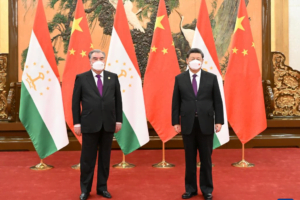Abstract
The United States, after several missteps, has once again begun to forge an anti-Chinese alliance in the Indian and Pacific Oceans. This time everything seems to be going well. Britain is returning to the imperial policy of “east of Suez” and there is a basis for a potential Asian NATO: the military alliance AUKUS, an Anglo-Saxon bloc of Washington, London and Canberra. The alliance’s main candidates, regional leaders Japan and India, are increasingly wary of China. What could go wrong?
Never in recent history have relations between Britain and its former colony of Australia and the United States been as close as they have been over the past eight years. The Daily Telegraph of London made this claim on Monday, citing the creation in September 2021 of the politico-military pact AUKUS (Australia-UK-U.S.) and London’s “commitment to ’tilt’ its foreign and security policy toward the Indo-Pacific region.”
If since the 1970s, when Britain joined the European Community, London has been winding down its imperial policy “east of the Suez Canal,” we are now seeing the reverse process, The Telegraph believes. Last Friday, Britain took a step toward turning the Washington-London-Canberra axis into something more.
The initiative of the British parliamentarian appeared simultaneously with the publication of the Tokyo Sunkei Shimbun: the U.S. is working on the possibility of deploying American intermediate-range missiles as part of its “support” for Japan. There are reports, in particular, of new hypersonic LRHW missiles and ground-launched Tomahawk cruise missiles. The Rossiyskaya Gazeta newspaper notes that Kyushu Island, which is geographically close to China, Japan’s main geopolitical opponent, is mentioned as one of the locations of the missiles. And India’s main macro-regional rival, we might add. As The Times of India noted on February 3, New Delhi has spent about $24 billion over the past five years on the purchase of foreign weapons (including American-made ones). Among other things, it was reported that India intends to purchase 850 drones to monitor the operational environment near China’s borders
India’s and Japan’s obvious fears of a stronger neighbor objectively coincide with the United States’ main (and equally obvious) goal of finding an effective way to contain, and ideally weaken or disintegrate, the PRC. The traditional triumvirate of the senior partner, the United States and the junior partner, Japan and South Korea, is not entirely effective. If only because the Chinese have long made South Korea their economic and trade partner. According to the Federation of Korean Industries, trade between the two countries increased 40-fold from 1990 to 2020, while South Korean exports to the EU, Latin America and India decreased.
Washington has been trying for years, at least since Barack Obama’s presidency, to create a broad anti-Chinese coalition in East Asia to replace the aforementioned triumvirate. The first such project, the Trans-Pacific Partnership promoted by Obama (essentially a trade agreement with several countries in the region that partially isolated the Chinese economy and forced the Chinese to play by American rules in regional trade issues) was buried by Donald Trump under the slogan of the need to protect American business interests.
The quadrilateral QUAD forum (created under George W. Bush and including the United States, India, Australia, and Japan) has been more successful. In 2017, the Quartet leaders agreed to cooperate more closely on security issues – including countering Chinese claims to the entire South China Sea.
Finally, the most important U.S. organization to contain China was the British-American-Australian AUKUS, established in 2021. The countries, in fact, did not conceal the fact that it was created specifically to deter China militarily. Beijing itself calls AUKUS an organization “provoking a military confrontation in the region”
The pact, of course, is very promising and much more concentrated than the conventional QUAD. “At the moment, QUAD is an informal quadrilateral dialogue that includes humanitarian issues in addition to security issues. AUKUS is more formalized, aimed almost exclusively at security cooperation. However, a full-fledged alliance may well emerge from it in the future,” Alexei Kupriyanov, head of the Center for Indo-Pacific Studies at IMEMO RAS, told REGNUM news agency.
However, compared to QUAD, AUKUS has one important drawback – it has no local, regional states. The U.S. and Britain are external powers, and Australia, though a Pacific power, is still not a South Asian or East Asian power. That is why AUKUS, according to London and Washington, should include the leaders of the respective parts of the Indo-Pacific region – that is, India and Japan.
“It was obvious that such plans would emerge sooner or later. The question is how much potential members want to join AUKUS. Everything will depend on what commitments they will be required to make. If it is only a question of technology and intelligence transfer, then why not. If they will be required to take part in anti-Chinese actions in case of a possible attack on another AUKUS member, it will mean joining a full-fledged defense alliance, in fact,” explains Kupriyanov.
It would seem that there should be no special problems here. Both countries have good reason to fear Chinese expansion, and both countries (given their armies and GDPs) would make an important contribution to strengthening the AUKUS should it expand. According to Global FirePower rankings, the Indian armed forces are the 4th most powerful army in the world (after the U.S., Russian and Chinese armed forces); Japan’s Self-Defense Forces are in 8th place. The World Bank and IMF estimated in 2022 that India and Japan were ranked third and fourth, respectively, behind China and the United States.
In reality, however, things are not so simple. Despite its territorial conflict with China, which periodically translates into border skirmishes, India is not ready to join AUKUS. Prime Minister Narendra Modi has been diplomatically maneuvering all these years, not allowing himself to be dragged into any adventures, trying to build a modus vivendi with the Chinese – and not wanting to commit himself to participate in the aggressive plans of Britain and the US against the PRC.
“For India, this is a complete break with all of its previous policies that it has pursued since independence, and for it to go for it, something has to happen that fundamentally changes the balance of power on the board. Well, for example, a clash with China with a large number of victims,” explains Kupriyanov. No such clash is currently foreseen, at least because India and China have nuclear weapons, and any large clash on the border could lead to the outbreak of nuclear war. New Delhi and Beijing understand this, so they are sober about each other’s interests.
As for Japan, the U.S. and Britain stand a much better chance. The Japanese authorities (unlike India) do not have nuclear weapons. They are closer to China and are more dependent on the security of East Asian trade routes, which Beijing intends to take control of. Finally, the Japanese are much more closely integrated with the Americans than the Indians, and they are much more confident that without the United States they would lose a future war with the PRC, which Tokyo sees as almost inevitable. This is why Japan has already stated that it is ready to enter into seemingly foreign conflicts in East Asia – for example, in the defense of Taiwan against Chinese invasion. And this is why the Japanese authorities would presumably give the go-ahead to join AUKUS, if they were approached with a proposal to do so.
source: regnum












